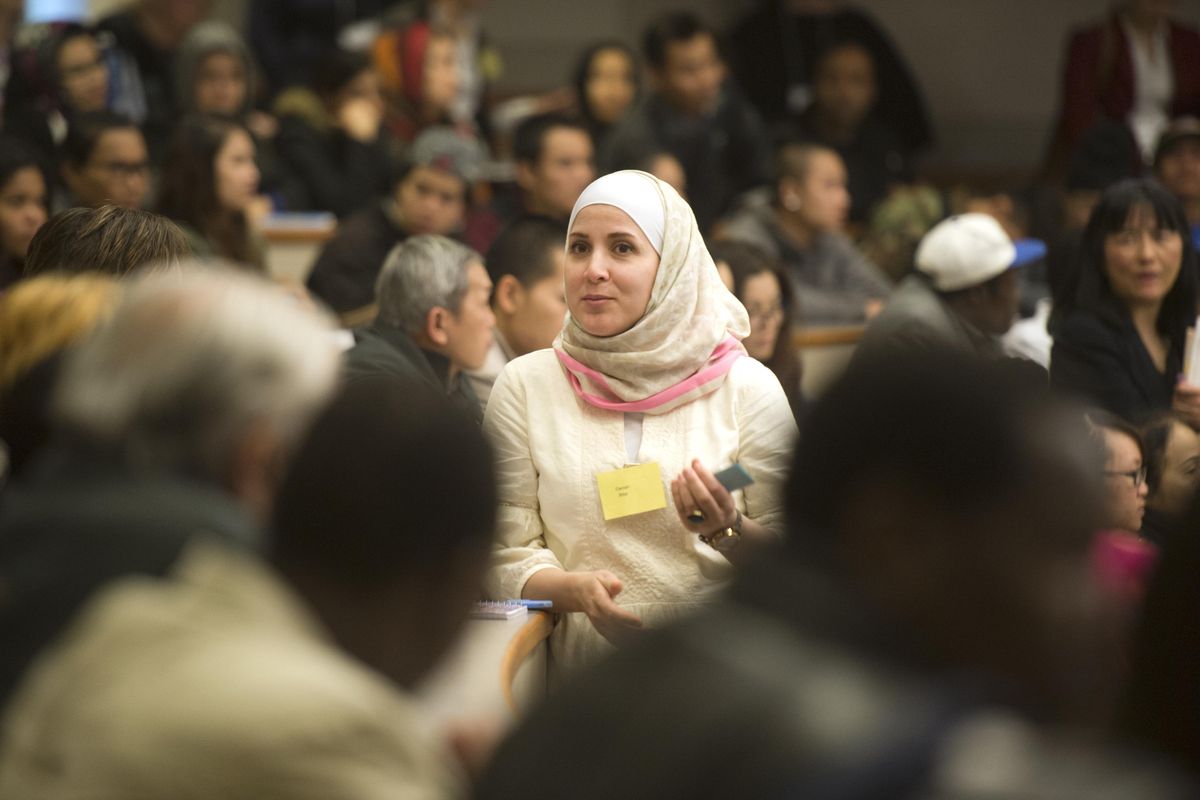Refugees, immigrants introduced to American laws and government at Spokane workshop

Washington Supreme Court Justice Mary Yu spoke slowly, pausing after every sentence.
The sound reverberated around the packed Gonzaga Law School mock courtroom in a murmur as translators repeated her words in Spanish, Farsi, Russian, Arabic, Vietnamese and a half dozen other languages.
Yu traveled across the state this week to speak to a group of recent immigrants and refugees about American laws and government.
She explained concepts like the rule of law, the basics of the U.S. Constitution and the rights guaranteed to everyone in America, including freedom of speech and due process.
“In some countries around the world, the law is only what the president says and it is never written,” she explained to the group. The United States is not like that, she said.
The workshop, sponsored by Refugee Connections Spokane, Community Colleges of Spokane and Gonzaga Law School, aims to educate recently arrived immigrants and refugees about the rights and resources they have in the justice system. More than 200 people attended Wednesday’s workshop, which was the largest in the program’s history.
Sessions focus on topics like domestic violence law, employment and housing discrimination and deportable crimes, with Spokane police officers, judges and attorneys leading the discussion.
Immigrants taking English classes at Spokane’s community colleges are bused to Gonzaga for the day to participate in the program.
This week’s workshop was the third offered since 2013. The idea came from city public defender Francis Adewale, who got his law degree in Nigeria before immigrating to the U.S. in 2000.
He said he got the idea after seeing several recent immigrants end up in court because of cultural misunderstandings. A few years ago, he represented an African man who was charged with reckless endangerment after leaving his 5- and 6- year-old children in the car while shopping at Goodwill.
“In Africa, the whole community watches the kids,” Adewale explained. The man saw there were other adults in the parking lot and assumed his children would be taken care of, not knowing leaving them alone could be a crime.
He also represented a man charged with luring for playing soccer with young children he didn’t know while offering them candy. In many parts of the world, it’s common for children and adults to play freely together in the community, he said.
Spokane police Sgt. Dan Waters was on hand to pass out native language cards to the group in case they’re stopped by police officers. The cards list the immigrant’s name, native language and an English-speaking contact person the officer should call.
Waters said he hoped seeing an officer in a uniform would make police seem accessible and convey the idea that officers want to help recent immigrants, not shake them down for bribes.
“Americans are nervous when a cop’s in the room,” he said. “If you’re here … and you don’t know the language and customs, I imagine it’s quite a bit worse.”
Yu had never participated in the workshop before and said she’d like to see a similar program started in Seattle, which also has a large refugee population. As the daughter of Chinese and Mexican immigrants, Yu said she wanted to help other immigrants and show what it’s possible for them to achieve in the United States.
“It has always mattered to me to look around the room and see people like me, so I feel a sense of responsibility to others,” she said.
Speaking to the group, she encouraged them to pursue education and make sure their children attend good schools.
“We welcome you. We want you. And we believe that you will enrich your communities and our state,” Yu said.